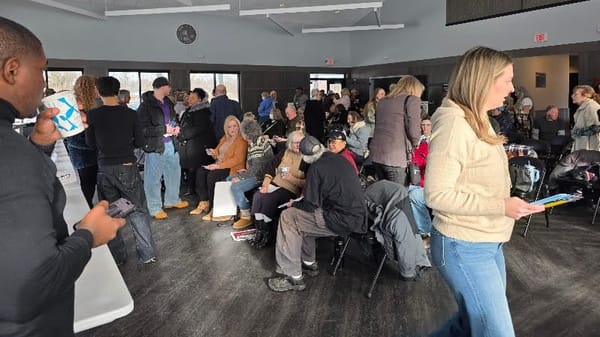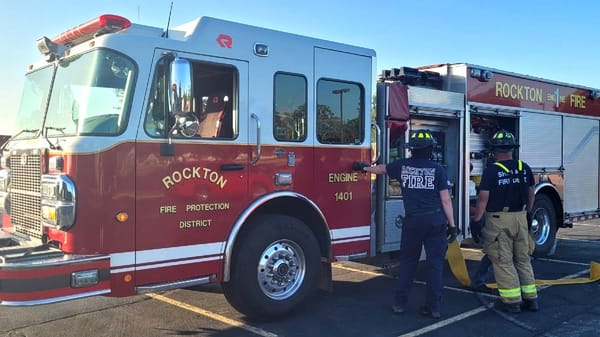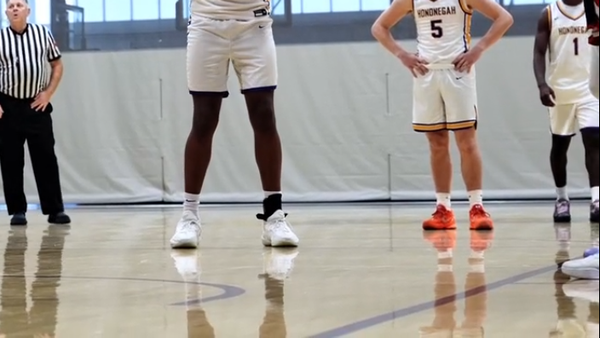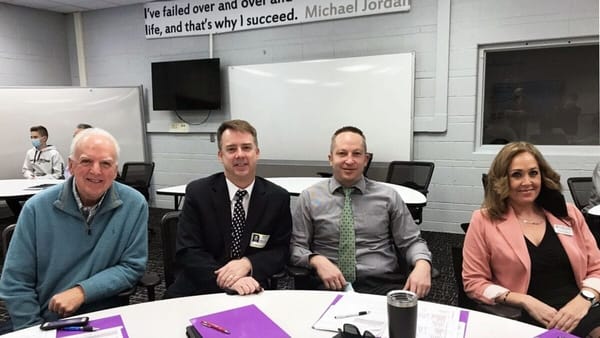John Doe v. Hononegah: football frustration and lawsuit
When a Rockton football mom reported a problem, her son quit the team.

A federal lawsuit alleges that an unnamed Hononegah High School football player became a victim of retaliation after his parent wrote the letter that led to Hononegah forfeiting a game to Harlem. His attorney claims that school officials showed the parent's letter to the very transfer student whose eligibility was in question, and students then began threatening the player and his family. Reportedly he eventually quit the team. According to the plaintiffs, the incident violated U.S. Civil Statute Section 1983 that covers retaliation over freedom of speech.
The players
Kelly Vecchio of Vecchio Law Offices filed the suit, Doe v. Hononegah [PDF], in Illinois Northern District Court on Oct. 18, 2024. Though she demanded a jury trial, she won't act as the trial attorney if the case gets that far. Part of a family of attorneys, she concentrates in the areas of divorce, child custody, child support, and guardianship. She is a former Winnebago County Board member for Roscoe's District 7, a position now held by Paul Arena. In 2007, she told the Rockford Register Star that the best advice she ever received was "Do unto others as you would have them do unto you," that her worst personality trait is "I like to always be right," and that "life is too short to be rude."
Hononegah is represented in the lawsuit by Ellen Lueking of Miller, Tracy, Braun, Funk & Miller, Ltd. Before entering law school, she was a teacher - she coached middle school and high school volleyball in Fairfield IL. She holds a master's degree in Physical Education and Coaching Pedagogy, besides her Juris Doctorate, from Southern Illinois University. She was trained in forensic interviewing techniques by the Child Advocacy Centers of Illinois and the Zero Abuse Project.
Other perspectives
Defendants in the case are Hononegah principal Chad Dougherty, head football coach Brian Zimmerman, athletic director Andrew Walters, assistant quarterback coach Jeremy Warren, Title IX officer Kendra Asbury, and the Hononegah Community High School District #207.
The student/plaintiff is known simply as "John Doe." Vecchio asked the judge to allow that pseudonym since he is still a high school student and may face further retaliation. She assured the judge, "The complaint has been fully anonymized for this student and the team member [the transfer student] to protect the identity of all minors and students involved."
Though the player's identity has not been released, the parent revealed her own identity as a "football mom" in a court document. She said a now-deleted Facebook comment about the eligibility problem showed "a clear indication of my involvement" when it said, "One of our own football moms reported it."
The legal complaint [PDF] does not state the plaintiffs' identities, but most Hononegah students are aware of who they are. Students have been eagerly downloading and reading the 33-page document.
What allegedly happened
The incident began on Sept. 18, 2024, when the athlete's mother wrote to athletic director Andrew Walters "regarding the transfer and eligibility of a Hononegah student... to play on the Hononegah football team..." She demanded that the school investigate whether the transfer student was really a permanent resident of the Hononegah district. She complained, "His transfer and placement on the team has directly impacted my son's placement on the team and playing time, or lack thereof."
The unnamed mother listed several other points which seemed suspicious to her. Point #5 claimed that Coach Zimmerman had mentioned to his team some photos he had received from "a party which involved alcohol." She stated, "On information and belief, [the transfer student] was present at this party. No sanctions were issued against [the student] or other athletes who were present at the party."
Coach Zimmerman replied to the mother that afternoon, "Your point #5 is not true. I have not viewed any photos and it did not apply to this situation." He wrote, "I am very saddened that this is the way that you have decided to handle this situation. Some of your statements are completely untrue."
The mom thought she was asking about an investigation, not filing a Freedom of Information Act (FOIA) request. But her letter was forwarded to Dr. Kendra Asbury, who is responsible for FOIA requests at Hononegah. Asbury replied in a letter on Sept. 23 that "any records responsive to your request" about the transfer student's eligibility could allow someone to "identify the student with reasonable certainty, in violation of State and Federal law." The mother could always appeal that decision to the Illinois Attorney General's office.
According to WIFR, after the eligibility problem became known, athletic director Andrew Walters cooperated with the IHSA while they decided what would happen. On Sept. 20, the IHSA ruled that Hononegah would be under a year's probationary suspension and would have to forfeit its Sept. 13 victory against Harlem along with its undefeated status and top ranking in the NIC-10 conference. The IHSA ruled, "The school had begun, but not fully completed the appropriate eligibility paperwork related to a student-athlete’s transfer to Hononegah High School, making the student-athlete ineligible for the first three games of the season."
IHSA rules say, "If you transfer after classes begin for the current school term, you will definitely be ineligible for thirty days," even up to a full season. Most commonly, transfers are allowed when parents move or divorce.
What happened next?
On Sept. 24, Andrew Walters said, "As the Athletic Director, I take full responsibility for the oversight that led to this sanction. This athletic transfer’s timing and particular circumstances led to an oversight in my office’s protocols to ensure the student’s eligibility. I acknowledge this failure and assure our athletes and the community that we have taken immediate steps and will continue to be vigilant to ensure it does not happen again."
Matt Troha told us, "Probation means that if further infractions occur during a probationary period, there is an expectation that more significant penalties will be levied."
The controversy did not vanish after the probation. On Sept. 25, Coach Zimmerman messaged his team, "Also, if anyone is asking today, please remember that you have no comment about the situation. It is done. Flush it and use it for the next 5 Friday nights! Go Indians!"
But according to the mother, the situation wasn't done at all. That day, she emailed a letter, on Vecchio Law stationery, as a "notice of safety and other concerns for my son." He was removed from the student-run team Snapchat channel, a dominant form of communication at Hononegah. After he was gone, his mother says other players threatened violence against her as well as his girlfriend and discussed organizing a "F T" movement, including causing injuries and planting drugs in his backpack. She told her son that for his own safety, he should walk with other students on campus. She told Principal Chad Dougherty that she wanted the situation investigated, though she didn't want to name the students involved, meet with administrators, or have her son meet with them.
Mr. Dougherty wrote back on Oct. 2 that "we initiated a thorough and comprehensive bullying investigation," as best as they could without knowing for sure who the alleged perpetrators were, aside from the transfer student. They interviewed thirteen students and seven coaches, but "the interviews did not identify or corroborate any current students participating in the alleged infraction." The mother says that conclusion proved the school ignored her allegations, because she insists the whole football team joined in the harassment.
Dougherty also assured the mother they had put "supportive measures" into place. Athletic director Andrew Walters had spoken with the team, coaches were supervising the locker room at all times, Student Support Services personnel were available for counsel, and Student Agreement Forms would "restrict communication between individuals identified as having made specific comments."
Adult harassment?
In the letter, the mother claims that even "the coaches took action to retaliate" against her son - they kept him out of the Sept. 20 Homecoming game against Guilford, "except for the last 6 minutes." She says that for "all of last season and the first three games of this season," her son was "first in play." But his "role on the team immediately changed after my letter was sent last week." This letter went to IHSA Executive Director Craig Anderson, as well as Mr. Dougherty, Coach Zimmerman, Mr. Walters, Mr. Dugan, and Attorney Kurlinkus.
The mother asserts that retaliation against her son has "severely impacted [his] opportunities for college football prospects and scholarships [and] eliminated his opportunity to receive the exposure to college football coaches and recruiters."
Besides redress for free speech retaliation, the plaintiffs seek compensatory damages and punitive damages for breach for contract, willful concealment, and failure to protect. That is, they say Hononegah should have investigated the transfer student's eligibility, given her the results of the investigation, and protected her son from the bullying, harassment, and emotional distress he experienced after her letter became known.
Neither high school student was available to comment on whether the adults were accurate.
The IHSA stated on Oct. 21, "At this juncture, there is no new information in the lawsuit that leads us to believe that any further IHSA sanctions are warranted or forthcoming. Hononegah has qualified for the IHSA Football Playoffs and is expected to participate accordingly. We will continue to monitor the legal proceedings and will react should additional IHSA by-laws infractions be discovered through the legal proceedings. Out of respect for the legal process, we will abstain from further comment at this time.”





